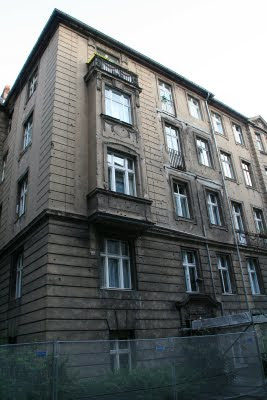January 3, 1995
We are in Berlin. The apartment shocked me on arrival. Like everything else, it too reminds me of WWII - primitive, cramped, above all cold. A reminder of the kalte Heimat after WWII – the destroyed one we left in Königsberg and the new one we entered in Werdau, Saxony. Want to start with my research right away but alas, other tasks need doing.
Building with WWII bullet holes
Yesterday, January 2, I found my way to the most important institution in the world, the bank.
I am in the West, my former home, but experienced myself as if shopping in unfamiliar stores. Had to buy bags and pack groceries myself, and then carried the heavy bags "home."
The only good thing I did was to contact my colleague at the research institute immediately. Above all, it was reassuring to learn that the archivists are expecting me.
The old gas stove in the kitchen depresses me. I cannot bring myself to touch it, so Irving cooked. He already knows that he will be doing it for the remainder of our stay in Berlin.
Another thing we have not solved, where and how to sleep. Our aristocratic landlady, a descendant of the famous theologian von Harnack (1851-1930), has obviously not checked the size and condition of the beds - nor has she checked the temperature of the "bedroom." – Our passion will save us, Irving says.
My task today is simple and straightforward. I must find my way to the archive using public transportation. I have the feeling that bus-drivers still do not know that Berlin is part of the new Germany and host city to many visitors. Bus stops are not announced! It is assumed we all know where to get off. When I ask in normal German where we are, the bus driver looks at me as if I am dada. “Ach Mensch,” I say frustrated, “Ich bin doch von Kanada.” “Ich auch,” he says and continues driving. Consider it sightseeing, Irving says.
Saturday January 7, 1995
Tuesday, Wednesday, and Thursdays I worked in the archive of the Berliner Missionswerk. The material is excellent. My having practiced writing in the old German Sutterlin script helps greatly reading missionaries' handwritings. Have some difficulty, however, getting used to the East Berlin atmosphere, to the mannerisms of East Berliners, to their poorer clothing and greyer buildings.
At the Berliner Missionswerk Archive
Irving cooked, shopped, and fixed various things in the apartment. He even went out and bought a new shower curtain and pink bathroom mats to cheer me up. Indeed, they brighten the old stuffy place. – Alas, there is method in his madness: he enjoys learning German at the stores; learning German equals shopping; he talks to all and sundry, and not just in the Goethe Institute. Only German grammar frustrates him; it is like a trap, even traps me at times.
Family matters took off too. The half-sister who is the most open and friendly, called back today. I let her know a few days ago that we arrived. She is already helping me plan our trip to her in Löhne. – Have not yet called my cousin E. in Hamburg nor contacted my childhood friend G. in Berlin. I am aware that calling all at once would overwhelm my emotions.
My contact at the Freie Univserität, a woman who, like me, had done research in Zambia, was preparing a paper for a conference in München. I will not see her until her return from there. She did suggest, however, that we participate in the colloquia at the Ethnological Institute of the university.
Our apartment is very cold. I freeze all the time. Telling our aristocratic landlady is useless. After all, she is not freezing. Fact is I have to buy warm clothing. The warm clothing that I brought from Canada, the land that is “really” cold, is simply not adequate. As if that is not enough, my attempt to sleep in the upstairs room was futile too. The temperature must have been sub-zero degrees. At any rate, I woke up with my hair frozen; on the top of my head it stood up like steel rods.
The beds too are too narrow; one is too short and too soft in the middle. When I pointed this out, the aristocratic landlady merely told me that a Chinese physicist had occupied that room. He was very happy in it, so happy in fact, that he asked to bring his wife over. She slept in that narrow, short, curved bed, and she was grateful – while I, alas, do nothing but complain.
Although our landlady is a retired physician, she has obviously not heard of marital intimacy. She is not nor ever was married – except to her ancestors, among them the founder of what is now called the Max Planck Institute.
I look at that bed and all I can think is poor Chinese woman; what did she really think? While I ponder whether I can stand it here for four months, Irving enjoys the city and travels about in it all day – learning German. He loves it. I am beginning to wonder whether my complaining has to do with my historical past. What is wrong with me? Do I want to see evidence of a harshness that once characterized wartime Germany? Is the evidence more in my heart than in Berlin?

